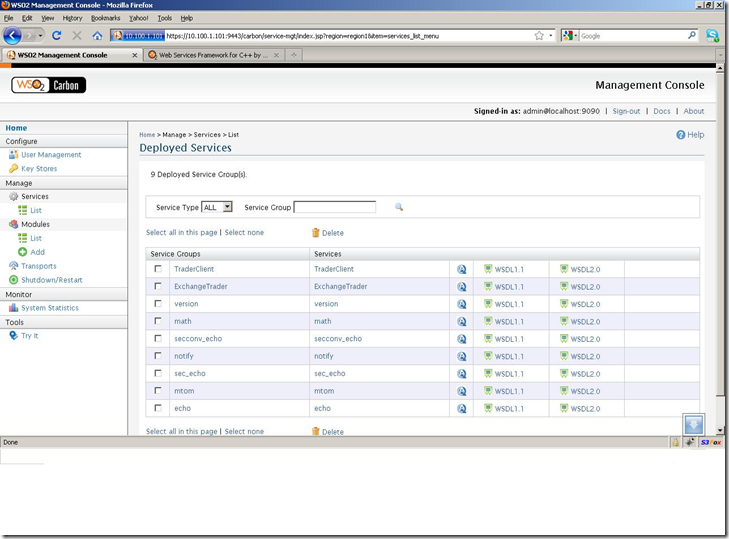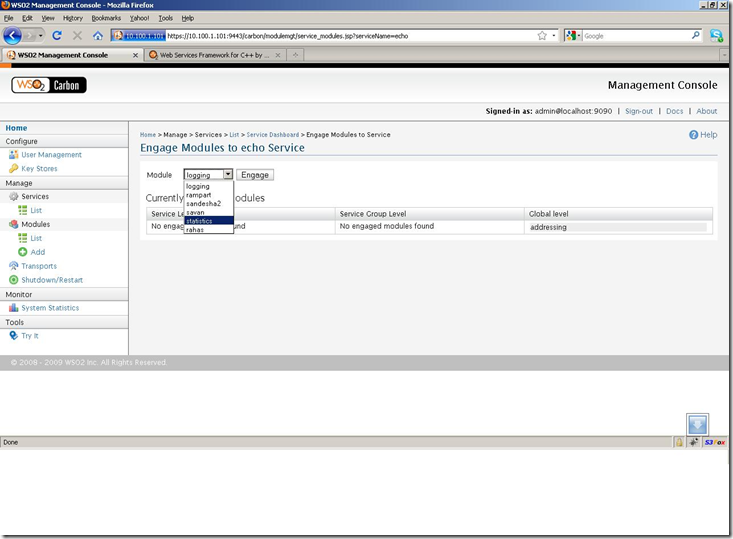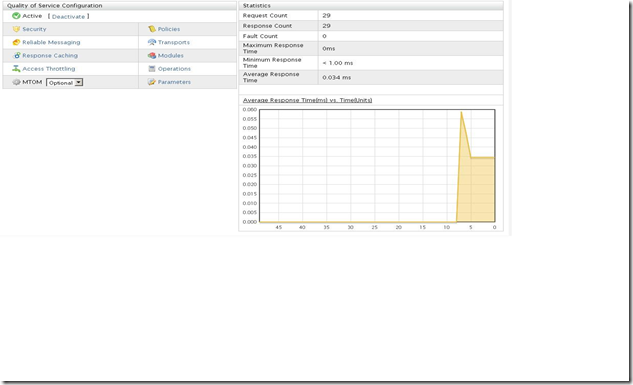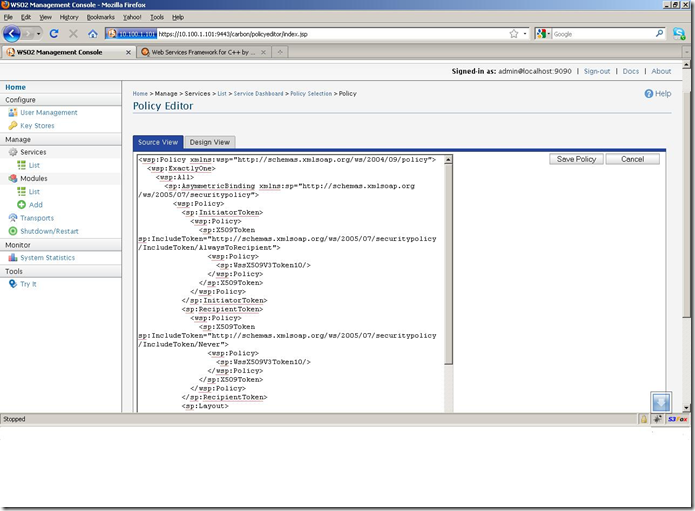We carried out a simple performance comparison between WSF/C++ , WSF/C against a set of other web services products. The results are published here.
Sunday, March 14, 2010
Wednesday, March 10, 2010
WSO2 Carbon Based Admin Console for Axis2/C WSF/C and WSF/C++
http://wso2.org/projects/wsf/cppWith the availability of WSO2 WSF Admin, now users can manage their C and C++ Web Services Deployed in Axis2/C, WSF/C or WSF/C++ using the GUI interface of Carbon. At present, WSF Admin is at first milestone and supports following set of features.
Service Listing and Module Listing
Security Configuration
Policy Editing
Service Statistics
Following are some of the screen shots of New WSF Admin Console with WSF/C++.
Engage Statistics Module to a service using the admin console and view the service usage statistics.
Configure Security
View and Edit Service Policies
There are lots of other functionality in-addition to the once I have shown above. WSF Admin is a set set of web services and modules implemented using WSO2 Web Services Framework, plus a Customized Carbon Instance. The Admin Console works by using web services interactions to the WSF/C Back End where the C Admin Services deployed. WSF Admin is also a demonstration of not only the interoperability of WSO2 products ( Between java based Carbon Platform and C/C++ based WSF Products ) but also the flexibility of WSO2 Carbon Platform.
WSF Admin milestone 1 release does not have the persistence and hence the configuration changes you make will not be preserved once you shutdown your server. The next release of WSF Admin will be having the persistence capability.
Monday, January 18, 2010
How to write a custom message receiver for WSF/CPP
When you have to go beyond the supported interface of a ServiceSkeleton when implementing a service, you can use a custom message receiver to achieve that functionality. For example, recently we encountered such scenario where the unparsed soap enveloped body has to be accessed for some custom logic. But when implementing a service using ServiceSkeleton interface, you would always ended up getting the first child of the soap body as an argument.
In that kind of a situation, the best option would be to implement a custom message receiver. WSF/CPP now provides a very convenient API for implementing a message receiver.
For implementing a custom message receiver, WSF/CPP provides a class named MessageReceiver. What a user has to do is to extend from this and implement the abstract method invokeBusinessLogicSync which will receive inflow message context and outflow message context as arguments. Then you have the full control over the processing of the message received by the message receiver.
Next add the macro WSF_MESSAGE_RECEIVER_INIT and pass the message receiver class name as the argument.
Next compile the written code as a shared library and place it in <WSFCPP_REPO>\lib directory. When implementing a service which would be invoked using this custom message receiver, set the name of the shared library as the “messageReceiver” parameter for each operation. For example, if the shared library name is “CustomMsgRecv”
<operation name=”Op1”><messageReceiver class=”CustomMsgRecv”/></operation>
Here is the example message receiver code.
/* CustomMsgRecv.h */
#include <MessageReceiver.h>
class CustomMsgRecv : public wso2wsf::MessageReceiver
{
public:
WSF_EXTERN bool WSF_CALL
invokeBusinessLogicSync(wso2wsf::MessageContext *inMsgCtx,
wso2wsf::MessageContext* outMsgCtx);
CustomMsgRecv(void);
~CustomMsgRecv(void);
};
/** CustomMsgRecv.cpp */
#include "CustomMsgRecv.h"
#include <MessageReceiver.h>
using namespace wso2wsf;
WSF_MESSAGE_RECEIVER_INIT(CustomMsgRecv)
CustomMsgRecv::CustomMsgRecv(void)
{
}
CustomMsgRecv::~CustomMsgRecv(void)
{
}
WSF_EXTERN bool WSF_CALL
CustomMsgRecv::invokeBusinessLogicSync(wso2wsf::MessageContext *inMsgCtx,
wso2wsf::MessageContext *outMsgCtx)
{
/** Add Your Logic Here */
}







